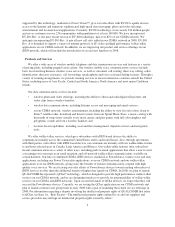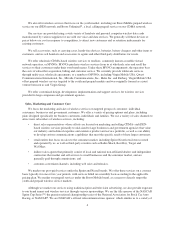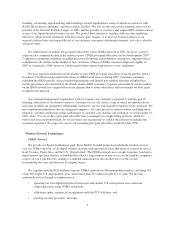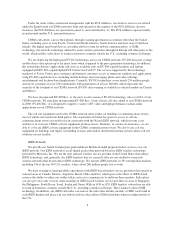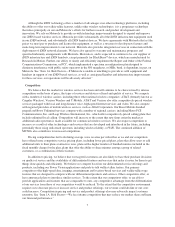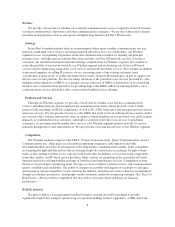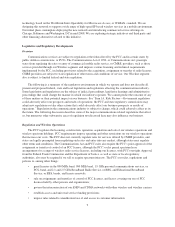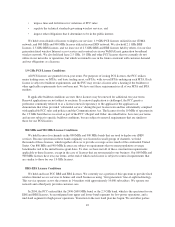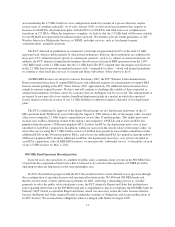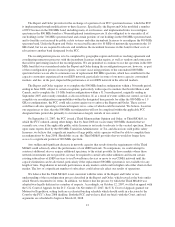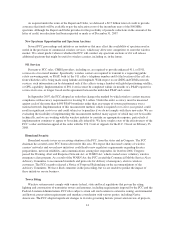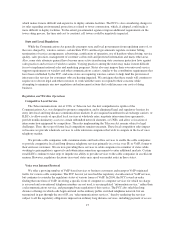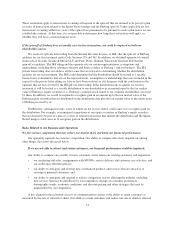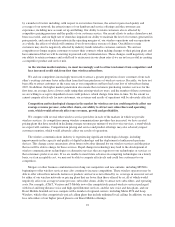Sprint - Nextel 2007 Annual Report Download - page 15
Download and view the complete annual report
Please find page 15 of the 2007 Sprint - Nextel annual report below. You can navigate through the pages in the report by either clicking on the pages listed below, or by using the keyword search tool below to find specific information within the annual report.In addition, as part of the Report and Order, the reconfiguration of the 1.9 GHz band was required to be
completed by September 7, 2007. On September 5, 2007, we, along with the Association for Maximum Service
Television, Inc., or MSTV, the National Association of Broadcasters, or NAB, and the Society of Broadcast
Engineers, or SBE, filed a joint petition requesting an additional 29 months to complete the transition of the
broadcast auxiliary service, or BAS, to frequencies above 2025 MHz. On November 6, 2007, the FCC granted a
waiver until January 5, 2008 to complete the BAS transition above 2025 MHz. On December 6, 2007, Sprint
Nextel, the MSTV, the NAB and the SBE submitted a consensus plan for completing the transition of the BAS
licensees that should complete the BAS transition by September 2009. The FCC subsequently extended the
waiver of the BAS relocation date until March 5, 2008 and encouraged the BAS licensees and new entrant
mobile-satellite service licensees to continue discussing ways to share use of the spectrum before the transition is
completed.
The Report and Order requires us to make a payment to the U.S. Treasury at the conclusion of the band
reconfiguration process to the extent that the value of the 1.9 GHz spectrum we received exceeds the total of the
value of licenses for spectrum positions in the 700 MHz and 800 MHz bands that we surrendered under the
decision, plus the actual costs that we incur to retune incumbents and our own facilities under the Report and
Order. The FCC determined under the Report and Order that, for purposes of calculating that payment amount,
the value of the 1.9 GHz spectrum is about $4.9 billion and the aggregate value of the 700 MHz spectrum and the
800 MHz spectrum surrendered, net of 800 MHz spectrum received as part of the exchange, is about $2.1 billion,
which, because of the potential payment to the U.S. Treasury, results in minimum cash expenditures of about
$2.8 billion by us under the Report and Order. The FCC has designated the TA to monitor, facilitate and review
our expenditures for 800 MHz band reconfiguration. A precise methodology for evaluating and confirming our
internal network costs has not yet been established by the TA. Because the TA may not agree that all of the costs
we submit as external and internal costs are appropriate or are subject to credit, we may incur certain costs as part
of the reconfiguration process for which we will not receive credit against the potential payment to the U.S.
Treasury.
In addition, a financial reconciliation is required to be completed at the end of the reconfiguration
implementation to determine whether the value of the spectrum rights received exceeds the total of (i) the value
of spectrum rights that are surrendered and (ii) the qualifying costs referred to above. If so, we will be required to
pay the difference to the U.S. Treasury, as described above. Based on the FCC’s determination of the values of
the spectrum rights received and surrendered by Nextel, the minimum obligation to be incurred under the Report
and Order is $2.8 billion. The Report and Order also provides that qualifying costs we incur as part of the
reconfiguration plan, including costs to reconfigure our own infrastructure and spectrum positions, can be used to
offset the minimum obligation of $2.8 billion; however, we are obligated to pay the full amount of the costs
relating to the reconfiguration plan, even if those costs exceed that amount. From the inception of the program
and through December 31, 2007, we have incurred approximately $1.1 billion of costs directly attributable to the
spectrum reconfiguration program. This amount does not include any of our internal network costs that we have
preliminarily allocated to the reconfiguration program for capacity sites and modifications for which we may
request credit under the reconfiguration program. If we are successful in our appeal of the Third MO&O, we
estimate, based on our experience to date with the reconfiguration program and on information currently
available, that our total direct costs attributable to complete the spectrum reconfiguration will range between $2.7
billion and $3.4 billion. This estimate is dependent on significant assumptions including the final licensee costs,
and costs associated with relocating licensees in the Canadian and Mexican border regions for which there are
currently no approved border plans. In addition, the above range does not include any of our apportioned internal
network costs. Actual results could differ from such estimates. In addition, we are entitled to receive
reimbursement from the mobile-satellite service licensees for their pro rata portion of our costs of clearing a
portion of the 1.9 GHz spectrum. Those licensees may be unable or unwilling to reimburse us for their share of
the costs, which we estimate to be approximately $200 million. If we are unsuccessful in our appeal of the Third
MO&O, we anticipate that our costs could exceed $3.4 billion by an amount that would likely be material.
However, we believe that it is unlikely we will be required to make a payment to the U.S. Treasury.
13


